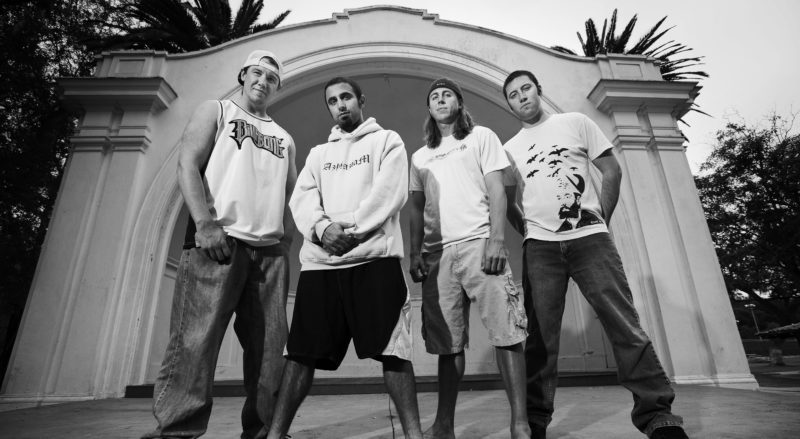INTERVIEW: Rebelution’s Eric Rachmany on his reggae influences and big summer tour
Photo: Rebelution are having “good vibes” on their summer tour. Photo courtesy of the band.
This summer, the rock-reggae group Rebelution will headline an outdoor concert tour with Matisyahu, Collie Buddz and Zion I. The Santa Monica band, featuring Eric Rachmany on vocals/guitar, Rory Carey on keyboards, Marley D. Williams on bass and Wesley Finley on drums, is ready to embark on what could be a career-defining trek across the United States. It’s the band’s first headlining amphitheater tour, a chance for the quartet to bring their unique reggae to even more fans.
For Rachmany, the prospects for the next few months have him jazzed. “It’s going to be a good run with a lot of really good acts with us,” he said recently during a phone interview. “We’re with Matisyahu and Collie Buddz and another hip-hop group from the Bay area called Zion I. They’re all just great.”
The men of Rebelution have come a long way since their college days. “A few of us met in music classes, and then once we started kind of covering reggae tunes, we met our keyboard player Rory Carey,” Rachmany said. “It was all in the college community really that we met each other. And then after we were a band for a little bit, we started writing original songs and then kind of just took off from there.”
Rachmany said it’s up to him to bring the idea for many of the songs to the rest of the band. He provides the blueprint, and then the rest of the band members add their instrumental flavors and help define the “overall atmosphere of the song.” Their style of music is difficult to classify. Certainly it would fall in the reggae category, but Rebelution also has obvious rock and world music roots.
“All of us have different influences. … It’s definitely like a hybrid type of reggae music. And it’s constantly evolving, too. I think we have a lot of songs [that] don’t even remind me of reggae at all. Yeah, and especially the last album we had.”

That last album, Peace of Mind, broke several rules for the music industry. Rather than releasing the songs in the traditional format, the band members gave their fans three versions of the songs (original, dub and acoustic). It was another example of the “evolved sound” Rachmany seems to enjoy. “It’s really exciting because reggae … it’s a simplistic form of music. And so it’s up to us to try to make it fun and really manipulate it to make it sound like something else. So that part is really cool and fun.”
Peace of Mind was a success in Rachmany’s mind. The unique format allowed Rebelution fans to enjoy the same songs but in mellower tones. The dub tracks sound “tripped out,” he added.
Rachmany’s exposure to reggae music began in high school when he went with his sister to see the legendary Don Carlos, a Jamaican reggae singer who still tours the world. “I was in the front and center just listening to reggae live,” he said. “It just kind of blew me away and kind of opened doors to listen to other types of reggae music, and then I was always into, you know, singer-songewriter music, world music, classic rock, rap, hip hop. And then I realized I could write songs, you know, in kind of a reggae format but make it sound like a pop song, make it sound like a rock song, make it sound like hip hop, make it sound like whatever. … And then I met the other guys, and they were sort of into all types of music. Every song is a little bit different, but you know when we come together, somehow it’s always Rebelution. It’s a Rebelution sound.”
Rachmany said that in concert the band members try to sound like they do on the CDs. However, after that initial stage, they take some creative risks. “When I go see an artist, I want to hear that they can sound like they do on the CD first. Otherwise it’s kind of like, well, who knows exactly how they produced that sound on the record. Did it actually come naturally and organically, or was it completely, you know, electronically produced to make that sound? So that’s the first thing I look for. That’s something I want to prove. I like that challenge to try to sound like we do on the album. But once I can prove that, once I can prove my vocals, once all the instrumentalists can prove that they can play the parts, then it’s kind of like, all right, well, we have the crowd’s trust. And then we can try some other stuff.”
The fans, who have been increasing in number since the band broke out of the southern California scene, are quite varied. Rachmany said even his 2-year-old cousin is a huge devotee, knowing every word and crying to his parents when they don’t play some Rebelution in the car.
The acceptance of the band has come from both the fans and the reggae community. “We didn’t grow up in Jamaica, and reggae wasn’t always in my life until, you know, close to like 10 years ago,” he said. “I think people in that community understand that we’re bringing a different style, but I think they dig it. And at the end of the day that’s all that really matters. If you like the music and it sounds good to you, then it’s good. And people have been showing us love, so it’s awesome.”
Rachmany said that sometimes there’s a misconception about reggae and its perceived simplification. Now, 10 years into his newfound love, he said he realizes there’s much more variance to the style and that it comes “from all over the world.”
“I definitely think that we have an original sound,” he said. “I grew up in a Persian Jewish household, and I was exposed to a lot of world music growing up. Personally a lot of my vocals sound, to me they sound Middle Eastern … Everybody in the band comes from a different background.”
That unique sound will be on display for the Good Vibes Summer Tour, kicking off Aug. 7. Prior to those U.S. dates, the band heads across Europe and stops in Chicago for the North Coast Music Festival.
“Honestly the best part is getting on stage,” Rachmany said. “We’re family, for sure, when we get on stage. We know exactly what we’re doing. We really feed off each other’s energy.”
By John Soltes / Publisher / John@HollywoodSoapbox.com
Click here for more information.

